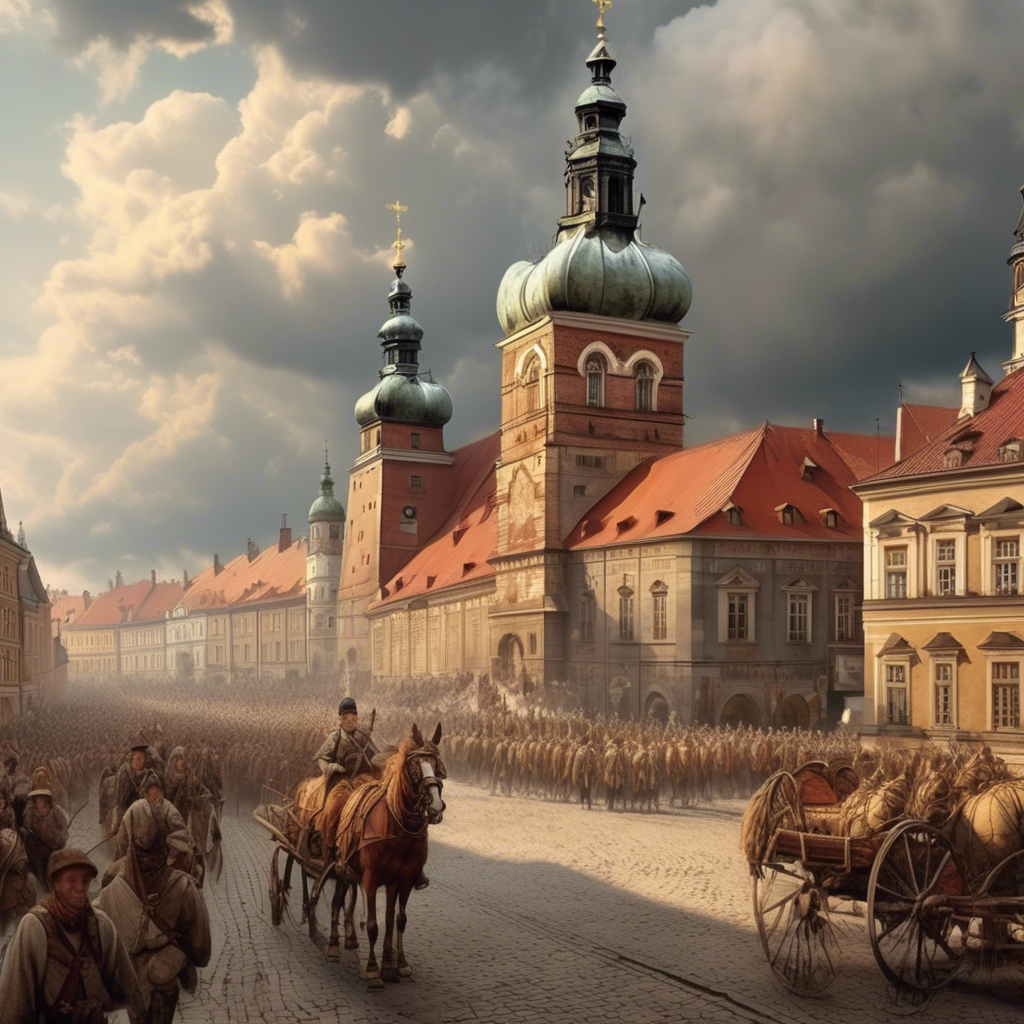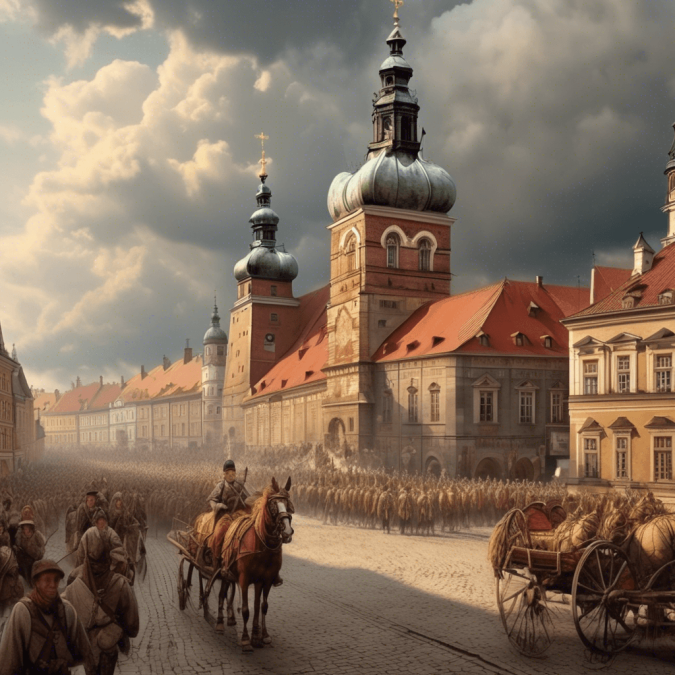
1. Introduction
Overview of the project
The project on the history of Poland aims to provide a comprehensive exploration of the nation’s rich and complex past. By delving into the key events, figures, and developments that have shaped Poland’s history, this project seeks to offer a detailed account of the country’s evolution from its origins to the present day.
Objectives and goals
The primary objectives of this project are to highlight the significant milestones in Poland’s history, analyze the cultural and social dynamics that have influenced the nation, and examine the political and economic transformations that have taken place over the centuries. By achieving these goals, the project aims to deepen our understanding of Poland’s heritage and its impact on contemporary society.
Scope and limitations
While this project strives to provide a comprehensive overview of Poland’s history, it is important to acknowledge the limitations of such an endeavor. Due to the vast scope of Polish history and the complexity of its narratives, this project may not cover every detail or aspect in depth. Nevertheless, the project aims to offer a well-rounded perspective on the key themes and developments that have defined Poland’s historical trajectory.
2. Background
Brief history of Poland
Poland’s history dates back to ancient times, with the emergence of early Slavic tribes in the region. The formation of the Polish state in the Middle Ages marked the beginning of a distinct national identity and political entity that would evolve over the centuries.
Key events and developments
Throughout its history, Poland has experienced a series of key events and developments that have shaped its destiny. From the coronation of the first Polish king to the partitions of the country by neighboring powers, these events have left a lasting impact on Poland’s political, social, and cultural landscape.
Important figures and leaders
Poland has been home to many prominent figures and leaders who have played pivotal roles in shaping the nation’s history. From monarchs and statesmen to artists and intellectuals, these individuals have left their mark on Poland’s identity and legacy.
3. Timeline of Events
Prehistoric and early history
The prehistoric and early history of Poland is characterized by the migration of various tribes and the establishment of early settlements. The development of agriculture and trade laid the foundation for the emergence of organized societies in the region.
Medieval period
The medieval period in Poland saw the consolidation of the Polish state, the adoption of Christianity, and the expansion of Polish territories. The reign of notable monarchs such as Casimir the Great and Jagiello marked a period of cultural and political flourishing.
Polish-Lithuanian Commonwealth
The Polish-Lithuanian Commonwealth, established in the 16th century, was a powerful multinational state that encompassed vast territories in Eastern Europe. The Commonwealth‘s golden age was marked by political stability, religious tolerance, and cultural achievements.
Partition of Poland
The partition of Poland in the late 18th century by Prussia, Russia, and Austria divided the country and led to a period of foreign domination and national struggle. The partitions profoundly impacted Polish society and fueled a spirit of resistance and national revival.
World War I and II
Poland’s involvement in World War I and II had significant consequences for the country’s sovereignty and territorial integrity. The devastation of war, the atrocities of the Holocaust, and the struggle for independence shaped Poland’s experience during these tumultuous periods.
Communist era
The post-World War II period saw Poland fall under communist rule as part of the Eastern Bloc. The communist era was marked by political repression, economic challenges, and social upheaval, as Poland grappled with the realities of Soviet influence.
Transition to democracy
The transition to democracy in Poland in the late 20th century marked a new chapter in the country’s history. The Solidarity movement, led by Lech Walesa, played a crucial role in challenging communist rule and paving the way for democratic reforms in Poland.
4. Cultural and Social History
Language and literature
Polish language and literature have played a vital role in shaping the country’s cultural identity. From medieval manuscripts to modern literary works, Polish writers and poets have contributed to a rich literary tradition that reflects the nation’s history and values.
Religion and traditions
Religion has been a central aspect of Polish society, with Catholicism serving as a unifying force for the nation. Traditional customs, festivals, and rituals continue to be an integral part of Polish culture, reflecting a deep-rooted connection to heritage and faith.
Art and architecture
Polish art and architecture showcase a diverse range of styles and influences, from Gothic cathedrals to Renaissance palaces and modernist masterpieces. Polish artists and architects have made significant contributions to the cultural heritage of Europe and the world.
Education and science
Poland has a long tradition of academic excellence and scientific innovation. The country’s universities and research institutions have produced renowned scholars and discoveries that have contributed to advancements in various fields, from mathematics and astronomy to medicine and technology.
5. Political History
Government and administration
Poland’s political history is marked by a complex system of governance that has evolved over the centuries. From the early monarchies to the contemporary democratic republic, Poland has experienced a diverse range of political structures and institutions.
Wars and conflicts
Wars and conflicts have been a recurring theme in Poland’s history, from medieval battles to modern conflicts. The country’s strategic location in Central Europe has made it a battleground for competing powers and ideologies, shaping its military history and national identity.
Foreign relations
Poland’s foreign relations have been influenced by its geographic position and historical experiences. The country’s diplomatic engagements with neighboring states, European powers, and international organizations have played a crucial role in shaping its alliances and partnerships.
Political parties and movements
Poland has a vibrant political landscape characterized by diverse parties and movements that reflect the country’s democratic values and pluralistic society. From nationalist movements to liberal parties, Polish politics has been shaped by a range of ideologies and agendas.
6. Economic History
Agriculture and industry
Agriculture and industry have been key components of Poland’s economy throughout its history. The country’s fertile lands and natural resources have supported a strong agricultural sector, while industrial developments have driven economic growth and urbanization.
Trade and commerce
Poland’s strategic location at the crossroads of Europe has made it a hub for trade and commerce. The country’s historical trading routes and ports have facilitated the exchange of goods and ideas, contributing to Poland’s economic prosperity and cultural diversity.
Economic reforms and challenges
Poland has undergone significant economic reforms and transformations in the post-communist era. From privatization and market liberalization to EU integration and globalization, the country has faced a range of challenges and opportunities in its pursuit of economic development.
7. Conclusion
Summary of key findings
The project on the history of Poland has provided a comprehensive overview of the nation’s past, highlighting key events, developments, and themes that have shaped its identity. From ancient settlements to modern democracy, Poland’s history is a testament to its resilience, creativity, and spirit.
Significance of Poland’s history
Poland’s history holds significant importance not only for the nation itself but also for the broader European and global context. As a key player in Central Europe, Poland’s historical experiences have influenced regional politics, culture, and identity. The country’s struggles for independence, religious tolerance, and democratic values have resonated with movements for freedom and human rights around the world. By studying Poland’s history, we gain insights into the complexities of nation-building, governance, and societal change that are relevant to contemporary challenges and opportunities.
Future prospects and research opportunities
As Poland continues to evolve in the 21st century, there are numerous opportunities for further research and exploration of its history. From interdisciplinary studies on the intersections of politics, culture, and economics to comparative analyses with other European nations, there is much to uncover and analyze in Poland’s historical trajectory. By engaging in ongoing research and dialogue on Poland’s past, scholars and enthusiasts can contribute to a deeper understanding of the country’s heritage and its relevance to current global issues.
8. References
List of sources and materials used
– Davies, Norman. “God’s Playground: A History of Poland.” Oxford University Press, 2005.
– Lukowski, Jerzy, and Zawadzki, Hubert. “A Concise History of Poland.” Cambridge University Press, 2001.
– Snyder, Timothy. “Bloodlands: Europe Between Hitler and Stalin.” Basic Books, 2010.
– Wandycz, Piotr S. “The Price of Freedom: A History of East Central Europe from the Middle Ages to the Present.” Routledge, 2001.
Bibliography
– Skowronek, Jerzy. “Poland: A History.” Hippocrene Books, 2011.
– Zamoyski, Adam. “The Polish Way: A Thousand-Year History of the Poles and Their Culture.” Hippocrene Books, 1994.
– Prazmowska, Anita J. “A History of Poland.” Palgrave Macmillan, 2004.
– Kieniewicz, Stefan. “The Emancipation of the Polish Peasantry: The Gentry Liberal Policy in Congress Poland, 1832-1863.” Oxford University Press, 1999.
